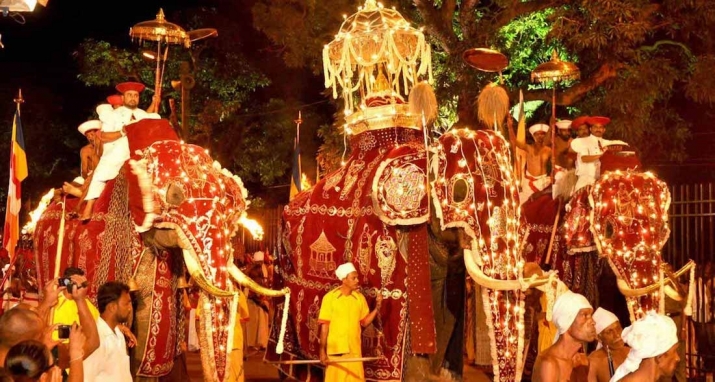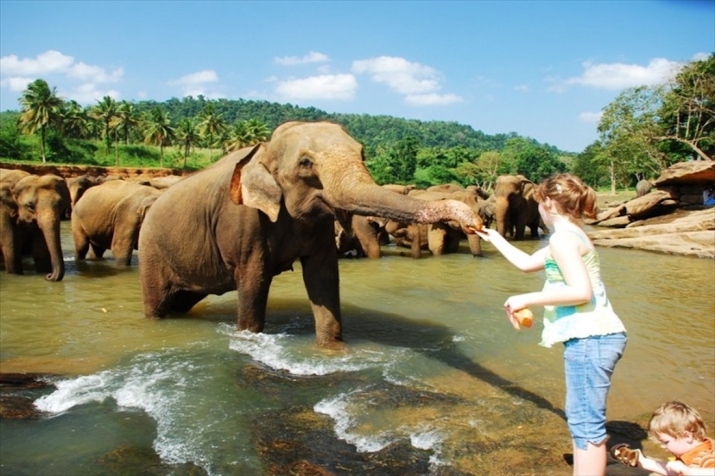NEWS
Sri Lanka Approves New Legislation to Protect Elephants
 Decorated elephants at a perahera in Sri Lanka. From angelstravels.com.
Decorated elephants at a perahera in Sri Lanka. From angelstravels.com.Sri Lanka’s government has introduced tougher legislation aimed at protecting elephants in the island nation from exploitation. The new laws include banning the use of captive elephants under the age of five, ensuring a diet of fresh fruit and vegetables for elephants living in captivity, and a requirement for daily exercise. The authorities have also prohibited the famous Pinnawala Elephant Orphanage in the town of Kegalle from placing orphan elephants in zoos, according to Deutsche Welle.
Since coming to power in 2015, the Sri Lankan government has started clamping down on the illegal ownership of elephants—many of which are captured from the wild illegally. In November last year, Agence France-Presse reported that under the new regulations, violators could lose their ownership licenses and face a jail term of up to three years.
On 24 January, a workshop on how to manage wild elephants was organized by Sri Lanka’s 123-year-old Wildlife and Nature Protection Society, attended by a number of prominent wildlife conservation activists. The participants of the event, titled “Workshop on the Policy for the Conservation and Management of Wild Elephants,” presented several recommendations for protecting Sri Lanka’s wild elephants, including strengthening cooperation between divisional-level organizations, sharing information among researchers, building electric fences to protect villages and agricultural fields, and drawing up strategies to make politicians aware of human-elephant-conflicts and its proper management.
Although a 2011 census report showed an increase of the number of elephants in Sri Lanka, wildlife conservationists remain concerned that factors such as deforestation due to urbanization, the use of wild animals as gifts for VIPs, and ownership of elephants as a status symbol among the rich could harm the island's population of wild elephants. According to the conservationists, the popularity of owning baby elephants is a major problem for two main reasons: animal welfare and diminishing wild populations. There has also been an increase in reports of elephant attacks on villagers, which wildlife experts believe to be due to deforestation.
Prithiviraj Fernando, a scientist and chairman of the Sri Lanka-based Centre for Conservation and Research, told Deutsche Welle that the domestication of any baby elephant from the wild is cruel: “Traditional domestication involves ‘breaking in’ the animal. In this process, elephants are usually starved and beaten and then rewarded.” Fernando also noted that the relationship between mother elephants and their offpsring is as least as strong as that of human mothers and their babies. “When the mother is separated from its baby, the mother suffers emotional stress and makes valiant efforts to reunite,” Fernando emphasized.
Many, however, do not welcome the new laws, as elephants have been an integral part of cultural and historical traditions in Sri Lanka since ancient times. The famous Buddhist processions, known as peraheras locally, require a good number of elephants. Many perahera organizers expressed concern over the government's restrictions on capturing wild baby elephants. On 10 February, Prime Minister Ranil Wickramasinge, at the closing ceremony for a major annual perahera in Colombo, assured the public that the government would continue to provide elephants for public festivals. “The government will not stop providing elephants to peraheras,” he said. “The government will soon reveal more details about steps it intends taking in resolving issues pertaining to illegal rearing of elephants and providing animals for peraheras.” (Daily Mirror)
 Elephants at Pinnawala Elephant Orphanage in Kegalle. From awesomelanka.com
Elephants at Pinnawala Elephant Orphanage in Kegalle. From awesomelanka.comSee more
Sri Lanka tackles the elephant in the room (Deutsche Welle)
Govt. will not stop providing elephants for Peraheras: PM (Daily Mirror)
Sri Lanka bans use of young elephants for work (Yahoo News)
Let’s save our wild elephants (The Sunday Times)
Shortage of elephants in processions this year (Hiru News)
Compensation for victims of wild elephant attacks to be increased (Colombo Page)
Related news from Buddhistdoor Global
Animal Lovers Knitting Winter Jumbo Jackets for Abused Elephants in Mathura, India
Sri Lanka Clamps Down on Illegal Ownership of Wild Elephants
Buddhist Monk Wins Wildlife Service Award
World’s Largest Marine Wildlife Sanctuary Created in Antarctica
New Wildlife Reserve Could Help Save China’s Big Cats














